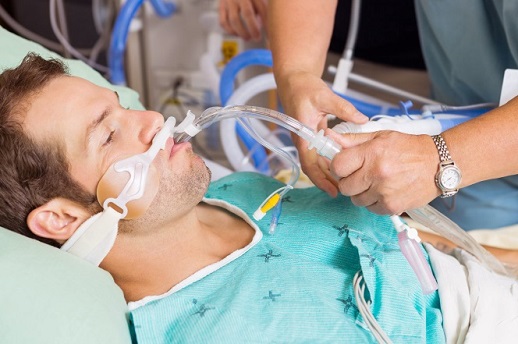Cardiac and Inflammatory Biomarkers Linked to Extubation Failure in COVID-19 Patients
Nikhil Prasad Fact checked by:Thailand Medical News Team Jan 10, 2025 1 year, 2 weeks, 12 hours, 25 minutes ago
Medical News: Extubation failure in critically ill patients, particularly those with COVID-19-induced acute respiratory distress syndrome (C-ARDS), remains a significant concern for healthcare providers. Despite advancements in treatment protocols, around 21.5% of patients undergoing mechanical ventilation experience extubation failure. A recent study covered in this
Medical News report, sheds light on the role of specific biomarkers in predicting such outcomes, providing insights that could reshape clinical practices.
 Cardiac and Inflammatory Biomarkers Linked to Extubation Failure in COVID-19 Patients
The Study Setup and Purpose
Cardiac and Inflammatory Biomarkers Linked to Extubation Failure in COVID-19 Patients
The Study Setup and Purpose
This retrospective cohort study was conducted at the Erasmus Medical Center in Rotterdam, the Netherlands, involving 297 patients who had undergone mechanical ventilation due to C-ARDS. The study aimed to determine the prognostic value of cardiac biomarkers - such as high-sensitivity Troponin T (Hs-TnT) and N-terminal pro-B-type natriuretic peptide (NT-proBNP) - and inflammatory markers like interleukin-6 (IL-6) and procalcitonin (PCT) in predicting extubation failure. Extubation failure was defined as the need for reintubation or death within seven days of extubation.
Key Biomarkers and Their Roles
The study’s findings highlight the importance of biomarkers measured on the day of extubation. Hs-TnT, NT-proBNP, and PCT levels were significantly elevated in patients who experienced extubation failure compared to those who did not. This article explores these findings and their potential implications for medical practice.
Study Findings
Out of the 297 patients included, 21.5% experienced extubation failure. The median age of the patients was 60 years, with 70% being male. Those who faced extubation failure were generally older and had longer durations of mechanical ventilation.
Cardiac Biomarkers
-High-Sensitivity Troponin T (Hs-TnT): This marker, commonly used to assess heart stress or damage, was independently associated with extubation failure. Patients with Hs-TnT levels of 14 ng/mL or higher had a significantly higher risk of extubation failure. The odds ratio (OR) for Hs-TnT, after adjusting for other clinical factors, was 1.38.
-N-terminal pro–B-type Natriuretic Peptide (NT-proBNP): While NT-proBNP was linked to extubation failure in univariate analysis, it lost its predictive power when adjusted for variables like age and SOFA (Sequential Organ Failure Assessment) scores. This suggests that its role might be secondary to clinical variables.
Inflammatory Biomarkers
-Procalcitonin (PCT): Elevated PCT levels (0.25 ng/mL or higher) were strongly associated with extubation failure. Patients with both high Hs-TnT and PCT levels had a 46% risk of failure, compared to only 13% in those with normal levels of these biomarkers.
&
lt;br />
-Interleukin-6 (IL-6): Interestingly, IL-6 levels did not independently predict extubation failure in this study. This may be due to the widespread use of interleukin-6 receptor antagonists like tocilizumab among the study population, which could have altered IL-6 dynamics.
Biomarker Interactions and Additive Effects
Patients with elevated levels of both Hs-TnT and PCT were at the highest risk of extubation failure, suggesting an additive effect. However, the study found no direct interaction between cardiac and inflammatory biomarkers, emphasizing that both pathways contribute independently to the risk.
Clinical Implications
The findings underscore the importance of integrating biomarker assessments into routine clinical practice. Hs-TnT, being an independent predictor of extubation failure, could serve as a valuable tool in assessing a patient’s readiness for extubation. Additionally, combining cardiac and inflammatory biomarkers with clinical parameters like age and SOFA scores could provide a more comprehensive approach to predicting extubation outcomes.
Study Strengths and Limitations
The study’s large sample size and focus on two distinct pathways - cardiac and inflammatory - are notable strengths. However, it also has limitations, including its single-center design and retrospective nature. Moreover, data on certain clinical factors, such as respiratory muscle strength and cough efficacy, were not available. Future studies should aim to validate these findings in broader patient populations and explore additional biomarkers related to respiratory muscle function.
Conclusions
Cardiac and inflammatory biomarkers measured on the day of extubation hold significant potential in predicting extubation failure in mechanically ventilated COVID-19 patients. Among these, Hs-TnT emerges as a reliable independent predictor, while elevated PCT levels further increase risk. Incorporating these biomarkers into clinical decision-making could enhance patient outcomes by facilitating more informed and tailored extubation strategies.
The study findings were published in the peer-reviewed journal: Annals of Intensive Care.
https://link.springer.com/article/10.1186/s13613-025-01425-3
For the latest COVID-19 News, keep on logging to Thailand
Medical News.
Read Also:
https://www.thailandmedical.news/news/covid-19-medical-devices-new-video-laryngoscope-for-faster-and-safer-intubation-during-covid-19-by-japanese-medical-device-maker-nihon-kohden
https://www.thailandmedical.news/news/covid-19-alerts-us-fda-revokes-eua-approvals-for-intubation-boxes--studies-show-that-these-intubation-boxes-are-harmful
https://www.thailandmedical.news/news/must-read-covid-19-aerosol-boxes-used-in-hospitals-to-protect-healthcare-staff-during-intubation-not-safe-according-to-new-study
